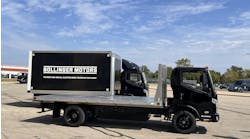As a tumultuous year in transportation winds to a close, your FleetOwner editors have looked back at the hundreds of articles we’ve written in 2023. The following stories show some of our top multi-cited work and other stories that FleetOwner.com readers clicked on the most.
The overarching theme of our most-read stories is operational efficiency: From how to better run a fleet to plan for an alt-fuel future to how a significant trucking operation fell apart this year. If you missed our other top 10 lists, you can drill down by subjects: Operations & Safety, Equipment, Technology, Media Gallery, IdeaXchange, Emissions & Efficiency, and Perspectives.
10. NFL QB’s highway death puts trucking maintenance on trial
A year after Pittsburgh Steelers quarterback Dwayne Haskins was struck and killed by a dump truck while walking across a highway in Fort Lauderdale, Florida, the Broward County law firm representing his family filed a civil suit naming 15 different defendants, including the truck driver, owner of the truck, and trucking company.
Rick Ellsley of The Ellsley Law Firm, who filed the suit on behalf of Haskins’ wife, Kalabrya Haskins, suggested undermaintained brakes and tires contributed to the 24-year-old’s death. Read more…
9. The humanless difference: Autonomous efficiency goes beyond fuel savings
LAS VEGAS—Early autonomous trucking is more fuel-efficient than traditional long-haul operations. However, the actual fleet savings could come from taking the trucker out of trucking. Like many Americans, the trucking industry is learning more about artificial intelligence's potential benefits and pitfalls.
AV companies told FleetOwner this week they are finding similar efficiency gains thanks to the smoother, slower, more predictable robotic driving on divided highways. But the greater financial savings could come from cutting human driver costs. Read more…
8. Many drivers can only dream of a full night's sleep
Over-the-road truck driver mental wellness, or the lack thereof, has drawn much more attention from numerous programs and industry stakeholders since the pandemic when isolation—and addictions—were exacerbated to a point where many see other related issues now at crisis levels: lack of sleep; lousy diet and nutrition; rest disrupted by sleep apnea from obesity; and drivers who can’t find ways, places, or time to burn calories and brighten their moods.
Many fleets are introducing increasingly innovative programs to improve driver health and wellness and address issues that can erode them. Read more…
7. Private fleets poised for transportation transformation
ORLANDO, Florida—As regulators, the public, and corporations push decarbonization into transportation, more fleets are asked to look beyond the cost and time to move freight. With no single zero-emission solution for every duty cycle, the transition will be difficult, but it also creates opportunities for early adopters.
"We're living in an age where 10 years is a century of transitions," Gary Petty, the National Private Truck Council's president and chief executive, said. Petty said his membership, including transportation leaders for some of the largest U.S. corporations, is primed to lead the way through this transformation. Read more…
6. How AT&T's fleet rebuilt Hawaii's network
As wildfires in Maui destroyed an estimated 2,200 homes and caused economic losses of up to $6 billion, a quick response was needed to rebuild the island's telecom infrastructure, leading AT&T, which operates the nation's largest private fleet, to deploy its Network Disaster Recovery team to navigate the logistical quandary.
The NDR team most commonly responds to storms, where they usually get several days' notice to haul in and stage equipment before the disaster, Dwayne Moore, NDR's area manager, told FleetOwner. For wildfires, a rapid response is necessary as blazes ignite quickly without warning in unpredictable areas. Read more…
5. How to build a detention management process
Driver detention ranked as a top industry challenge, No. 4 for truck drivers and No. 6 industry-wide, according to the American Transportation Research Institute's 2023 Top Industry Issues Report. However, some fleets are successfully deploying strategies to combat this time-killing supply chain kink.
Randal Sanchez, a solutions architect at McLeod Software, and his colleague, Kem Wallace, senior solutions architect at McLeod Software, recently surveyed large fleet companies that they felt had a "good handle" on detention management. Read more…
4. Ways fleets can set themselves up for financial success
Fleets have had their hands full. High fuel and equipment prices, labor concerns, shipping rates, inflation, and other economic factors continue to haunt businesses' bottom lines.
So, how can fleet executives set their companies up for financial success amid this volatile economic backdrop? Maybe some of the following suggestions will help. Read more…
3. Take time to test, before investing, in the future
The U.S. electrical grid isn’t ready to support the entire trucking industry. But that’s no reason not to get a feel for what the future of transportation is shaping up to be as regulators and others push the freight industry to be cleaner and more efficient.
“I’ve been in this industry 37 years, and clean and efficient has always been part of trucking,” Michael Roeth, executive director of the North American Council for Freight Efficiency, said. “We work hard to move goods—not only on time and at cost—but we’ve always had this clean-and-efficient thing that drives us.” Read more…
2. EPA’s new HD emissions rules push manufacturers and fleets to plan ahead
The U.S. Environmental Protection Agency published its final new rule for heavy-duty engines and vehicles in the Federal Register on Jan. 24, officially creating more stringent emissions rules for truck OEMs. As manufacturers refine and develop the technology to meet the next step of the EPA's Clean Truck Plan, fleets should consider how it affects their operations.
With the new emissions rules beginning with model year 2027 large trucks and engines, now is the time for fleets to start planning procurement strategies, according to several fleet leaders and equipment manufacturers, who spent much of 2023 mapping out the industry’s challenging future. Read more…
1. Yellow shuts down
The labor strife within and the operational decay of the once giant fleet spurred dozens of news stories throughout the year as the carrier fought with its unionized workers before it eventually folded and rivals looked to scoop up Yellow properties, equipment, and customers. Read more…













